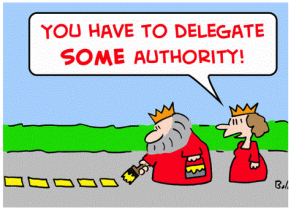 In my line of business, I often end up coaching around the challenges of delegation.
In my line of business, I often end up coaching around the challenges of delegation.
Today’s leaders and managers are expected to evolve and move with the latest business and organisational theories.
Normally the C-suite executive in conjunction with a consultancy will develop and adopt a strategic initiative which is then subsequently passed down to the senior management for planning and implementation.
The problem is that many managers are under extreme pressure to perform on their day role. So, when they are asked to take on additional responsibility for new initiatives it is difficult to find the extra time and so they have to delegate. Nothing new there! But something that is often missed is the fact that when you delegate the performance measurement remains at the delegation level. This results in an inclination to over scrutinize the delegate and this results in the unpleasant situation of micro-management. I think we have all been there at some time haven’t we?
Nobody is going to delegate a lot of power to a secretary that they can’t control – Michael Bloomberg
I have witnessed a number of delegation cascade failures with all the attendant micro management and disruption associated with each layer. This also includes the usual culmination of recrimination and good skilled people leaving or being terminated leaving serious skill shortages and much ill grace, and residual fear within the remaining community.
It’s not a case of IF, but more of a case of when …
When you have to delegate responsibility, then delegate to a team rather than to an individual person. Delegation to a team increases the possibility of the group completing the task whilst decreasing the potential for a Single Point Of Failure (SPOF). I first came across SPOF’s at Blandford doing radio relay theory – it just rolls off the tongue.
If you delegate to one person and they are overwhelmed, sick or injured…what can you do? Whilst I appreciate that the current business phase is very much focused on cost management, businesses are expected to develop robust processes and procedures which have built in redundancy and so should you! A memorable example of this was in a large government office where a senior procurement clerk was confined to bed early during her pregnancy and the resulting backlog of paperwork that only she was authorised to approve almost created a political incident.
Many IT systems require that certain roles are created to administer the system and to authorise various business elements and many companies think it perfectly acceptable to assign only one person to this function (See the SPOF? – Now there’s an accident just waiting to happen!)
Delegating to a team also involves the other team members and makes people feel involved as part of the company – ask people to help support the delegation initiative and you can assess people’s willingness and you have subsequent performance data as part of the continuous improvement programme and also for consideration in the performance appraisal process.
Evolution NOT Revolution
My tip, is to think evolution NOT revolution. Give people time to develop and grow into their new delegation challenge. Be encouraging and allow them to come up with their own ideas on how to resolve the issue and try to avoid dictating the way they must do it (unless it breaches any protocols) or must be done in a certain way. Empower your team to do the task with you guiding rather than directing them.
Communicate and manage delegation
If the report is not what you expected, then you didn’t define it properly, so it is not their fault. Take some time and specifically identify the changes you need and congratulate them on the elements they did well.
In the early stages, it will be difficult, because you do things in a different way. Allow yourself enough time to be able to review delegated work that is delivered back to you and set a high standard from the start. Don’t despair if the first few attempts need correction – coach the delegates towards your expectations and praise the good habits rather than beat ‘em up on the not so good stuff.
Key points to remember –
Avoid creating SPOF’s
Think evolution not revolution *slowly does it
Communicate what you are setting out to achieve
You can’t do it all on your own
Delegation is an art – choose carefully the task to delegate, choose carefully the team you will delegate to and work with them to understand what you want, how, when and why. Once you are happy with the output performance then you can achieve much more delegating other task freeing you up to focus on the strategic changes or maybe even moving up the ladder to your next role.
Good luck and remember the words of Steven Covey – “People and organizations don’t grow much without delegation and completed staff work because they are confined to the capacities of the boss and reflect both personal strengths and weaknesses.”

